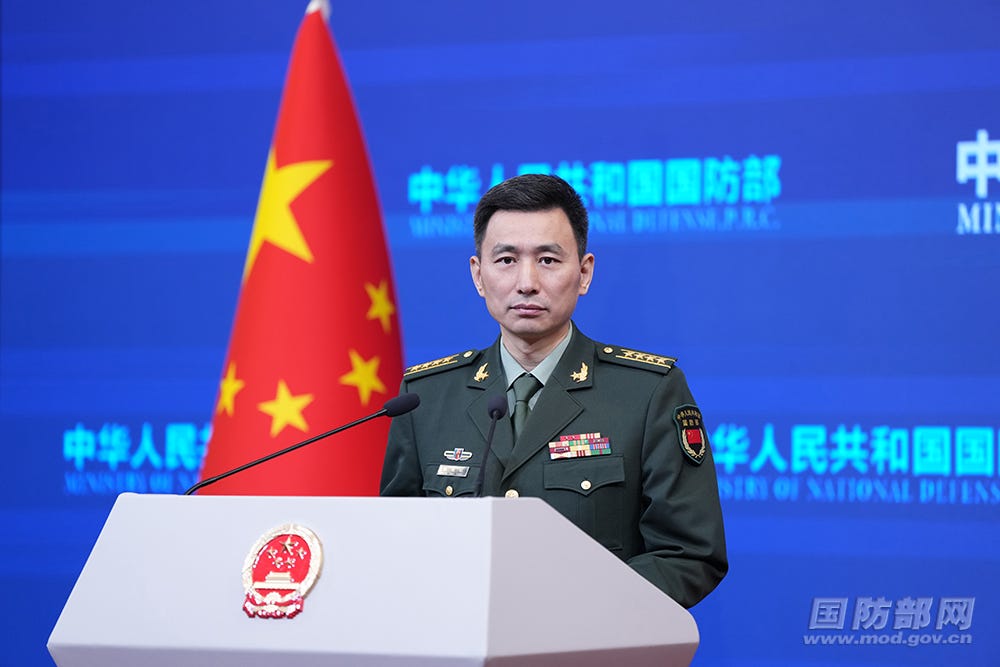PRC MND Regular Press Briefing on April 16, 2025
This briefing covered key military issues, including China-Vietnam ties and responses to US and Japanese actions on Taiwan.
(The following English text is for reference. In case of any divergence of interpretation, the Chinese text shall prevail. http://www.mod.gov.cn/gfbw/xwfyr/yzxwfb/16381002.html)
On the afternoon of April 16, 2025, Senior Colonel Zhang Xiaogang, Spokesperson for the Ministry of National Defense (MND), answered recent media queries concerning the military.
This briefing covered key military issues, including China-Vietnam ties and responses to US and Japanese actions. Spokesperson Zhang addressed questions on regional security, threat perceptions, and Taiwan:
Deepening China-Vietnam Military Ties and Security Cooperation
US Annual Threat Assessment: Cyber Threats and LLMs
Japan-US Exercise Simulating 'Taiwan Contingency'
US Defense Budget Potentially Reaching $1 Trillion
Response to Lai Ching-te's Remarks on US Relations and Purchases
Deepening China-Vietnam Military Ties and Security Cooperation
Journalist: President Xi Jinping recently visited Viet Nam, proposing six measures to deepen the China-Viet Nam community with a shared future. He emphasized building more robust security safeguards. How will China promote the military-to-military relationship?
Zhang Xiaogang: This year marks 75 years of China-Viet Nam diplomatic ties. President Xi Jinping, also General Secretary of the CPC Central Committee, visited Viet Nam April 14-15. He and General Secretary To Lam charted the course for state-to-state and military relations.
President Xi noted that at this new historical point, both sides must build on achievements. Key goals include stronger political trust, substantive security cooperation, deeper practical cooperation, and greater public support. Closer multilateral coordination and better difference management are also vital.
China and Viet Nam should advance comprehensive strategic cooperation with high-quality efforts. We must ensure steady progress in building a China-Viet Nam community with a shared future. This contributes to building a community with a shared future for mankind.
In recent years, our militaries enhanced their "camaraderie plus brotherhood" friendship. High-level engagements are frequent; we established a "3+3" strategic dialogue on diplomacy, defense, and public security. We conducted joint counter-terrorism exercises and activities like border defense exchanges and joint patrols.
Military relations achieved high-level, steady development. Building on this, China will work with Viet Nam toward shared goals. Under leaders' guidance, we'll strengthen strategic trust and coordination. We will enhance cooperation in political work, maritime security, joint exercises, and training, elevating military ties.
US Annual Threat Assessment: Cyber Threats and LLMs
Journalist: The US 2025 Annual Threat Assessment claims China is the biggest military and cyber threat. It suggests the PLA might use large language models for deceptive information operations. What is your comment?
Zhang Xiaogang: The US often accuses others of what it does itself. The US is a primary source of cyber attacks against China and a known global cyber threat. From WikiLeaks to Snowden, Stellar Wind, and Telescreen, the US has a poor cyber record.
It relentlessly surveils, steals secrets, and attacks others. Smearing China won't remove the US label as the "empire of hacking." We demand the US stop acting like a thief crying "stop thief."
The US must cease cyber attacks against China and others. It should restore a clean, secure cyberspace with responsible words and actions.
Japan-US Exercise Simulating 'Taiwan Contingency'
Journalist: Japanese media disclosed the Japan-US "Keen Edge 24" exercise featured a "Taiwan contingency" scenario. It simulated fighter jets attacking a PLA landing fleet. What’s your comment?
Zhang Xiaogang: Our consistent position is US-Japan military cooperation shouldn't target third parties or harm regional peace. The Taiwan question is China's internal affair; resolving it is our matter. Hyping a "Taiwan contingency" only fans flames and stirs trouble.
No one should underestimate the Chinese people's will to safeguard sovereignty and territorial integrity. Those using the "Taiwan card" to interfere or make military provocations will pay an unbearable price.
US Defense Budget Potentially Reaching $1 Trillion
Journalist: Reports suggest the US FY2026 defense budget might reach $1 trillion. This funding would enhance lethality and readiness. Your comments?
Zhang Xiaogang: We noted these reports. The huge defense budget again exposes US belligerence and belief in "might makes right." The US government is heavily indebted yet pours wealth exploited from others into weapons.
We hope the US abandons its obsession with hegemony soon. It should recognize that wanton force won't make America great again. It only brings disaster to its people and the world.
Response to Lai Ching-te's Remarks on US Relations and Purchases
Journalist: Lai Ching-te reportedly stated Taiwan won't impose retaliatory tariffs on the US. He asserted "enduring hardship is self-improvement," pledging large US agricultural, industrial, energy, and weapon purchases. Please comment.
Zhang Xiaogang: The Lai Ching-te authorities disregard local interests to curry favor with their "foreign master." This is essentially "offering up Taiwan's resources to win US favor." Such concessions deplete Taiwan's future and harm people's well-being.
The DPP authorities' attempts to solicit US support for "Taiwan independence" and resist reunification by force are a dead end.



